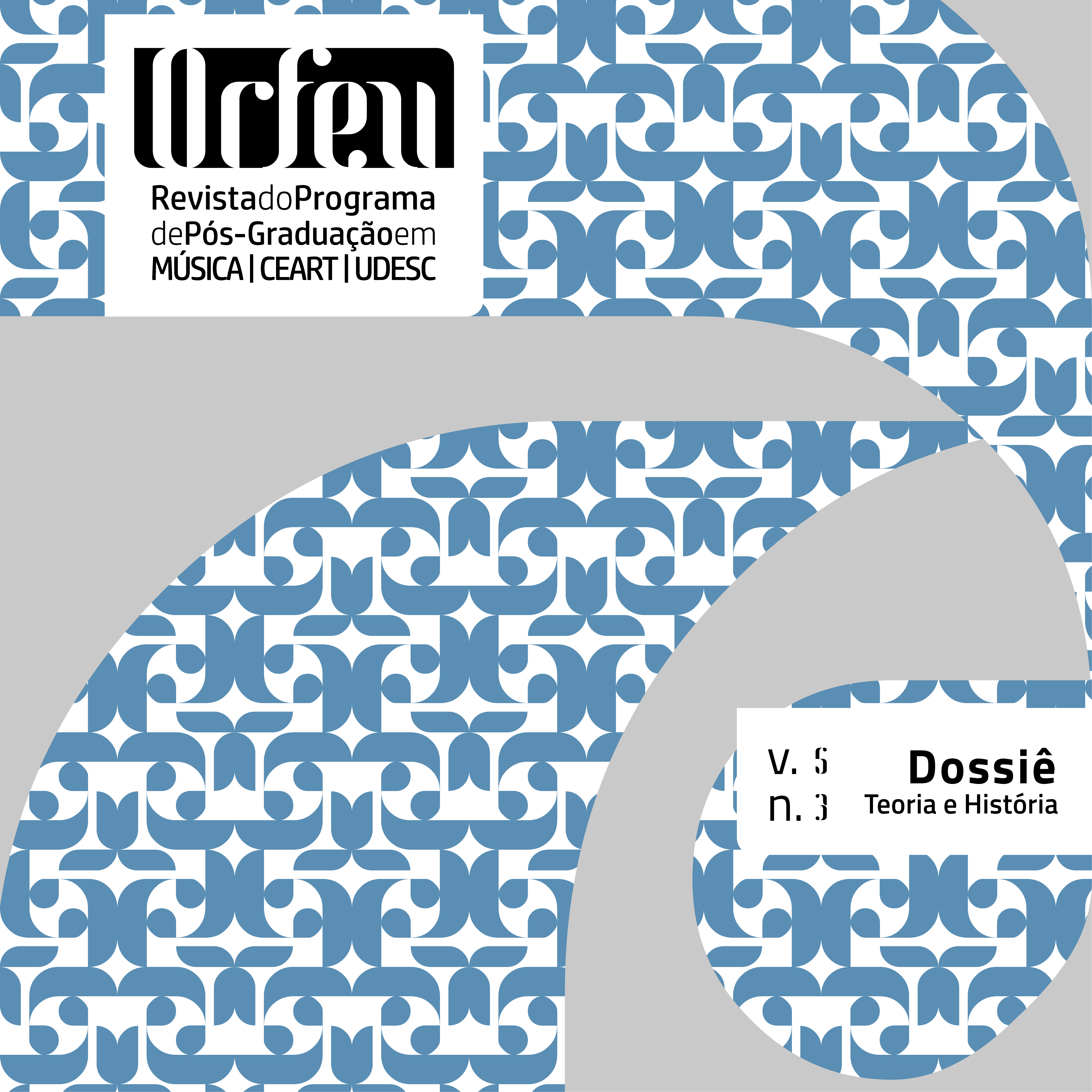A Transformational Approach for Musical Variation
DOI:
https://doi.org/10.5965/2525530405032020373Parole chiave:
Variation, Model of Derivative Analysis, Transformational theory, Similarity relations between musical ideasAbstract
This article is associated with a broad research addressing musical variation, whose main objective is the systematization of the analysis through the elaboration of an original analytical model. A new version of this model proposes a formal approach based on principles of the transformational theory. The present article is focused in the notion of variation isolated from a contextual framework (that is, out of temporal perspectives), setting the basis for further explorations. .Some original concepts, like derivative work, derivative space, attributes, among others, provide means for measurement of similarity relations between referential and derived musical ideas, as well as graphic representation for these relationships.
Downloads
Riferimenti bibliografici
ALMADA, Carlos (2019). Variation and Developing Variation under a Transformational Perspective. Musica Theorica, v.4, n.1, p.30-61.
ALMADA, Carlos (2017). Gödel-vector and Gödel-address as tools for genealogical determination of genetically-produced musical variants. In: The Musical-Mathematical Mind: Patterns and Transformations. Cham (Switzerland): Springer Verlag, p.9-16.
ALMADA, Carlos (2016). Derivative Analysis and Serial Music: the Theme of Schoenberg’s Orchestral Variations Op.31. Per Musi, v. 33, p.1-24.
ALMADA, Carlos (2015). Evolution in Musical Contexts: The Software DARWIN. In: XXV ENCONTRO ANUAL DA ANPPOM, 2015. Vitória. Anais ... Vitória: UFES.
ALMADA, Carlos (2013). Considerações sobre a análise de Grundgestalt: aplicada à música popular. Per Musi, n. 29, p. 117-124.
ALMADA, Carlos (2011). A variação progressiva aplicada na geração de ideias temáticas. In: II SIMPÓSIO INTERNACIONAL DE MUSICOLOGIA. Anais ... Rio de Janeiro: UFRJ, 2011. p.79-90.
AUERBACH, Brent (2005). The Analytical Grundgestalt: A New Model and Methodology Based on the Music of Johannes Brahms. Thesis (PhD in Music). University of Rochester.
BOSS, Jack (1992). Schoenberg's Op. 22 Radio Talk and Developing Variation in Atonal Music. Music Theory Spectrum, 14/2, pp. 125-149.
CARPENTER, Patricia (1983). Grundgestalt as tonal function. Music Theory Spectrum, 5, pp. 15-38.
COLLISON, Stephen (1994). Grundgestalt, Developing Variation, and Motivic Processes in the Music of Arnold Schoenberg: An Analytical Study of the String Quartets. Thesis (PhD in Music). King’s College.
DOWLING, Jay (1978). Scales and Contour: Two Components of a Theory of Memory for Melodies. Psychological Review, 85/4, pp.341-354.
EPSTEIN, David (1980). Beyond Orpheus: Studies in music structure. Cambridge: The MIT Press.
FRISCH, Walter (1984). Brahms and the Principle of Developing Variation. Los Angeles: University of California Press.
GOLLIN, Edward (2000). Representations of Space and Conceptions of Distance in Transformational Music Theories. Thesis (PhD in Music). Harvard University.
HAIMO, Ethan (1997). Developing Variation and Schoenberg’s Serial Music. Musical Analysis, 16/3, pp. 349-365.
HAIMO, Ethan (1990). Schoenberg’s Serial Odyssey: The Evolution of His Twelve-Tone Method 1914-1928. Oxford: Clarendon Press.
HOSKINSON, Darin (2006). The Grundgestalt and Network Transformations in the Late Choral Works of Anton Webern. Thesis (PhD in Music). University of Oregon.
HURON, David. Voice Leading: The Science Behind a Musical Art. Cambridge: The MIT Press, 2016.
HURON, David (2006). Sweet Anticipation: Music and the Psychology of Expectation. Cambridge: The MIT Press.
LEWIN, David (1987). Generalized Musical Intervals and Transformations. New Haven: Yale University Press.
MAYR, Desirée (2018). The Identification of Developing Variation in Johannes Brahms Op.78 and Leopoldo Miguéz Op.14 Violin Sonatas through Derivative Analysis. 2018. These (Doutorado em Música) – Universidade Federal do Rio de Janeiro.
MAYR, Desirée; ALMADA, Carlos (2017a). Geometrical and Vector Representation of Metrical Relations. In: II CONGRESSO DA ASSOCIAÇÃO NACIONAL DE TEORIA E ANÁLISE MUSICAL, 2017. Florianópolis. Anais ... Florianópolis: UDESC, p.10-19.
MAYR, Desirée; ALMADA, Carlos (2017b). Correlations between Developing Variation and Genetic Processes in the Analysis of Brahms' Violin Sonata Op.78. In: IX EUROPEAN CONGRESS OF MUSICAL ANALYSIS, (9.), 2017, Strasbourg. Proceedings... Strasbourg: EUROMAC (extended abstract).
MAYR, Desirée; ALMADA, Carlos (2016). Use of Linkage Technique in Johannes Brahms’ Op.78 and Leopoldo Miguéz’s Op.14 Violin Sonatas. Opus, v. 22, n. 2, p. 429-449.
McADAMS, Stephen & MATZKIN, Daniel (2001). Similarity, Invariance, and Musical Variation. In: Annals of the New York Academy of Sciences. Vol. 930: The Biological Foundations of Music, pp. 62-76.
MEYER, Leonard (1989). Style and Music. Chicago: The University of Chicago Press.
MORRIS, Robert (1987). Composition with Pitch-Classes: A Theory of Compositional Design. New Haven: Yale University Press.
NEFF, Severine (1984). Aspects of Grundgestalt in Schoenberg’s First String Quartet, Op.7. Journal of the Music Theory Society, 9/1-2, pp.7-56.
NG, Yuet (2005). A Grundgestalt Interpretation of Metric Dissonance in the Music of Brahms. Thesis (PhD in Music). Eastman School of Music, University of Rochester.
RINGS, Steve (2011). Tonality and Transformation. Oxford: Oxford University Press.
RUFER, Joseph (1954). Composition with Twelve Notes. (Humphrey Searle, trad.). London: Rocklife.
SCHIANO, Michael (1992). Arnold Schoenberg's Grundgestalt and its Influence. Thesis (PhD in Music). Brandeis University.
SCHOENBERG, Arnold (1984). Style and Idea: Selected Writings of Arnold Schoenberg. London: Faber & Faber.
TEMPERLEY, David (2001). The Cognition of Basic Musical Structures. Cambridge: The MIT Press.
TOUSSAINT, Gottfried (2013). The Geometry of Musical Rhythm: What Makes a "Good" Rhythm Good? Boca Raton: CRC Press.
Downloads
Pubblicato
Come citare
Fascicolo
Sezione
Licenza
Copyright (c) 2020 ORFEU

TQuesto lavoro è fornito con la licenza Creative Commons Attribuzione 4.0 Internazionale.






